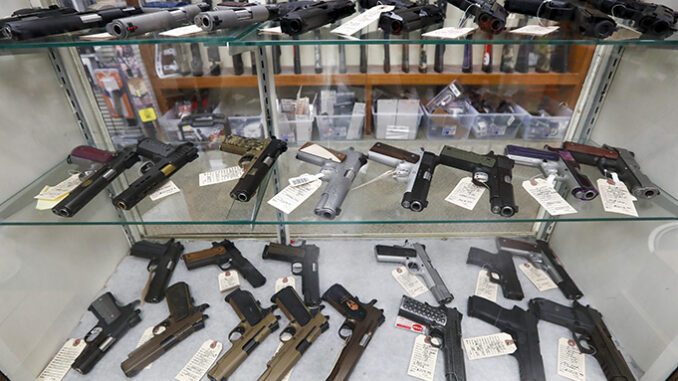
RALEIGH — North Carolina’s Democratic Gov. Roy Cooper is expected to veto a bill that would have repealed the state’s Pistol Purchase Permit law despite the bill being backed by the N.C. Sheriffs’ Association, who called the law “duplicative.”
House Bill 398 passed both chambers of the legislature and was sent to Cooper on Aug. 20. As of Aug. 24, he had not taken action on the measure.
Senate passed HB 398 by a vote of 27-20. All Democratic senators present voted it down. Voting no were Democratic Sens. Batch, Blue, Chaudhuri, Clark, Crawford, deViere, Fitch, Foushee, Garrett, J. Jackson, Lowe, Marcus, Mayfield, Mohammed, Murdock, Nickel, Robinson, Salvador, Waddell and Woodard.
The vote in the House was also along party lines, passing by a vote of 69-48.
House Bill 398 originally would have granted authority to county sheriff’s offices to issue a pistol purchase permit to “a resident of any contiguous county” if the current permit requirements are met. The language was changed, and the current version of the bill sent to the governor would have repealed the requirement of the sheriff issued pistol purchase permit entirely. The changes would also apply to a concealed handgun permit.
In a statement, state Senate Republicans blasted their Democratic counterparts for not voting to end a “Jim Crow-era pistol permit law that was used to deny black people their Second Amendment rights.”
“Senate Democrats cry ‘racism’ at nearly every turn. Yet they just voted to maintain a system actually created to disarm people of color, and which disproportionately impacts black people to this very day. Senate Democrats allege racism when it benefits them politically, but ignore it everywhere else,” State Sen. Chuck Edwards (R-Henderson) said in the statement.
The statement from Senate Republicans noted that according to a report by the UNC Law Review, “black applicants [for pistol permits] are rejected at a rate near three times as high as white applicants.” The statement also cited that “black applicants [are] experiencing a rejection rate of approximately three times the rate of white applicants” for pistol permits at the Wake County Sheriff’s Office.”
General Counsel for the N.C. Sheriffs’ Association Eddie Caldwell told North State Journal that the reason the association changed its position and backed the bill is due to the progress by the National Instant Criminal Background Check System (NICS) in getting mental health records uploaded into the system.
Caldwell said the pistol purchase permit was an alternative to NICS and that since firearm sellers also perform NICS checks on purchasers that sheriff-issued pistol permits were now “duplicative.”
“The sheriffs feel like it was a very valuable system that has just outlived its use,” said Caldwell.
Prior to being passed in the Senate, Democratic N.C. Attorney General Josh Stein issued a press statement claiming that removing the Pistol Purchase Permit process would “make North Carolinians less safe.”
“When sheriffs grant or deny permits to people to purchase a pistol, they do so after considering the risk that person might pose to their community,” said Stein. “This background check process is one of our most effective tools to keep guns out of the hands of domestic abusers, felons, and other dangerous people. However, this bill would remove sheriffs’ role in granting permits, taking away their ability to protect the people in their communities and making it easier for people who are dangerous to buy pistols.”
Stein went on to cite homicide rates in Missouri, claiming that “Two years after Missouri’s permit to purchase law was repealed, the firearm homicide rate spiked by 25%, and the firearm suicide rate went up by 14%.”
Grassroots North Carolina President Paul Valone called Attorney General Stein’s statement “the usual knee-jerk reaction of leftists to deny firearms to lawful citizens.”
Grassroots North Carolina is a nonprofit and the state’s largest firearms and Second Amendment advocacy group.
Valone went on to say that “particularly in urban areas, sheriffs no longer have personal knowledge of purchase permit applicants.” He also noted that the fact that mental health data is more promptly reported by clerks of court to the National Instant Background Check System (NICS) is what caused the North Carolina Sheriffs Association to support repeal, calling the permit system “duplicative.”
“Ironically, Stein opposes a bill which would improve background checks,” said Valone. “As noted by the Charlotte Observer, the present archaic system uses permits good for five years, allowing people to obtain permits, subsequently become disqualified from owning firearms, and then use the permit to bypass NICS. If purchase permits are repealed, background checks would be done at the time of purchase, not up to five years prior.”
Valone said that what is most disingenuous about Stein’s statement is his claim that Missouri homicides increased after repealing its purchase permit law.
“In truth, as demonstrated by the Crime Prevention Research Center, Missouri homicide increased by 32% in the five years prior to repealing the law, and then dropped by 15% after the repeal,” Valone pointed out. “Although it was higher after repeal than five years prior, it was actually lower than just before repeal.



